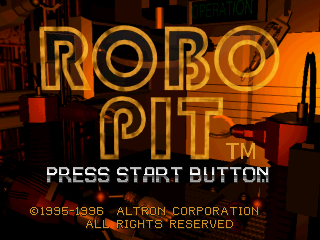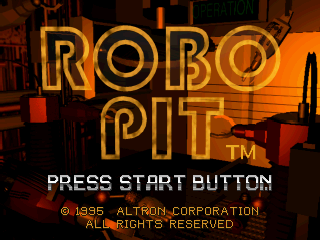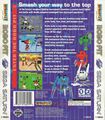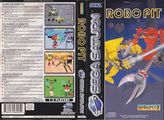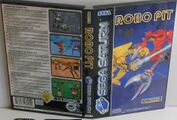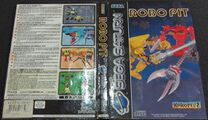Robo Pit
From Sega Retro
| ||||||||||||||||||||||||||||||||||||||||
| Robo Pit | ||||||||||||||||||||||||||||||||||||||||
|---|---|---|---|---|---|---|---|---|---|---|---|---|---|---|---|---|---|---|---|---|---|---|---|---|---|---|---|---|---|---|---|---|---|---|---|---|---|---|---|---|
| System(s): Sega Saturn | ||||||||||||||||||||||||||||||||||||||||
| Publisher: Altron, Kokopeli Digital Studios (US, Europe) | ||||||||||||||||||||||||||||||||||||||||
| Developer: Altron | ||||||||||||||||||||||||||||||||||||||||
| Distributor: Ecofilmes (PT) | ||||||||||||||||||||||||||||||||||||||||
| Sound driver: SCSP/CD-DA (12 tracks) | ||||||||||||||||||||||||||||||||||||||||
| Peripherals supported: Saturn Backup Memory | ||||||||||||||||||||||||||||||||||||||||
| Genre: Fighting Action/Taisen Action (対戦アクション)[1], Action[2] | ||||||||||||||||||||||||||||||||||||||||
| Number of players: 1-2 | ||||||||||||||||||||||||||||||||||||||||
| ||||||||||||||||||||||||||||||||||||||||
|
Robo Pit (ロボ・ピット) is a one-on-one fighting game developed by Altron for the Sega Saturn and PlayStation.
Contents
Gameplay
Robo Pit is a versus fighting game, in which players construct robots out of a selection of parts (a head/torso, eyes (because unlike the Western box art, the in-game robots opt for a "cute" aesthetic), "legs" and two arms) to fight one another on a 3D playing field. By default the camera is positioned behind the player, but it can be adjusted, for example, to create a first person fighting game.
You start with a ranking of 101, and can challenge any of the 100 robots ahead of you in an attempt to move up the rankings and into first place. Destroying your opponent will move you up, while losing will move you down. As you accumulate experience through matches, your robot becomes stronger which makes traversing up the rankings much easier - while it is fully possible to complete the game in a small handful of matches, the strongest robots will destroy you in one or two hits if the player hasn't practised.
An "auto fight" feature also exists, in which the computer will take control of your robot for you, however the outcome here is usually determined by raw stats rather than strategy, as the computer does not make full use of its surroundings.
Winning a battle can be achieved in two ways - either by draining a life bar or by knocking the opponent out of the ring. The winner then takes the opponent's arms (the only part of a robot that can be adjusted after its initial creation), which are often stronger than those found in the initial pool of components. Arms range from strong melee attacks such as swords and shields, to weaker long-range attacks like guns. Often an empty hand is a good way forward, as it can pick up obstacles on the field and throw them at enemies from afar.
Accumulated damage will add to a power bar allowing for special attacks. There is a standard ramming move available to all robots, and others which are determined by which arms are equipped. It is also possible to inflict damage just by jumping on your opponent.
There are about five stages (not including variants played at different times of the day) which are selected at random when entering a fight. Some matches feature special robots in their own arenas - the closest Robo Pit has to boss battles (although like all enemy robots, they can be avoided if the player chooses). The only battle that can't be avoided (although you may have to challenge the top ranking robot a few times to get into this position) is Zenith, a robot that only appears when the user is ranked at No. 1.
Robots
101 robots exist for the player to fight, however for most, their rankings, appearance and weaponry is randomised when the game starts. A handful of robots are always the same.
| Afterburn | |
|---|---|
| Assassin | |
| Badger | |
| Bansai | |
| Barney | |
| Bart | |
| Bebop | |
| Belfry | |
| Bigfoot | |
| Bomber | |
| Boom Frog | |
| Bouncer | |
| Bust Em | |
| Buzz | |
| Chop Chop | |
| Christine | |
| Clyde | |
| Crusher | |
| Da Judge | |
| Dangerman | |
| Dengar-D | |
| Dodger | |
| Doinkr | |
| Dr Fuji | |
| Droopnid | |
| Dum Dum | |
| Earthkill | |
| Edith | |
| Flyguy | |
| Gallagher | |
| Gamest | |
| Gen Chin | |
| Geomantis | |
| Gigantess | |
| Ginsu | |
| Grimace | |
| Guilus | |
| Guppy | |
| Gwendolyn | |
| Haley | |
| Hatchet | |
| Herman | |
| Hi Five | |
| Idaho | |
| Jackle D | |
| Kamikaze | |
| Lancelot | |
| Mata Hari | |
| Melonball | |
| Mercenary | |
| Metalhead | |
| Midnight | |
| Mohawk | |
| Mojo | |
| Mordred | |
| Murashi | |
| Napolean | |
| Natasha | |
| Ninja Bob | |
| Number 5 | |
| Pain Bot | |
| Paluka | |
| Panzer | |
| Pepto | |
| Pogboy | |
| Poison | |
| Pompador | |
| Purplexd | |
| Put Em Up | |
| Ranger | |
| Roach | |
| Rot n Bot | |
| Rusty | |
| Sayonara | |
| Shadelance | |
| Simon | |
| Sir Robin | |
| Skybot | |
| Slimer | |
| Slinky | |
| Sorbet | |
| Spartan | |
| Speedy | |
| Spinner | |
| Starbot | |
| System X | |
| Talen | |
| Taxiderm | |
| Teketeke | |
| Tex | |
| Tomtom | |
| Tortuka | |
| Trouble | |
| Twiggy | |
| Whizzer | |
| Wil Tell | |
| Wilfred | |
| Winky | |
| Wolf | |
| Yo Jimbo | |
| Zenith | |
Robot Making
Bodies
| Type A | |
|---|---|
| Type B | |
| Type C | |
| Type D | |
| Type E | |
| Type F | |
| Type G | |
| Type H | |
| Type I | |
| Type J | |
| Type K | |
| Type L | |
| Type M | |
| Type N | |
| Type O | |
Legs
| 2 Legs | |
|---|---|
| 6 Legs | |
| Spring | |
| Propeller | |
| Tank | |
| 3 Rings | |
| Light 6 Legs | |
| Heavy 2 Legs | |
| Hyper Prop | |
| Quick Tank | |
| 4 Rings | |
| 2 Springs | |
Arms
| Big Punch | |
|---|---|
| Middle Punch | |
| Punch | |
| Teke Arm | |
| Small Gun | |
| Bow Gun | |
| Cannon | |
| Hammer | |
| Slicer | |
| Sword | |
| Battle Axe | |
| Kama | |
| Katana | |
| Dagger | |
| Fire Punch | |
| Rocket Punch | |
| Heavy Hammer | |
| Shield | |
| Shield TypeB | |
| Lance | |
| Sucker | |
| Big Hand | |
| Big Mouth | |
| Boomerang | |
| Mace | |
| Spear | |
| Trident | |
| Buckler | |
| Laser Gun | |
| Taron | |
History
Legacy
In 1997 Altron released a sequel, Robo Pit 2, this time as a PlayStation exclusive. Robo Pit 2 is a huge departure from its predecessor, having more RPG-like features, an entirely different visual style, and attempting to bridge together a more cohesive story.
Versions
Despite launching a month after its PlayStation counterpart, the Sega Saturn version of Robo Pit is the more primitive of the two versions on a technical level, lacking much of the presentational polish of its rival. This is particularly noticable in areas such as the winning and losing messages - on the Saturn, there is often an long pause between the announcer saying "You" and "Win", with the second word sometimes failing to trigger altogether, while on the PlayStation the message is delivered more naturally. Special effects are also dialed back, and the lighting model is far simpler on the Saturn.
On a content basis, the Saturn version of Robo Pit heavily differs from the PS1 version despite being released close to it. The Saturn version features a completely redesigner user interface. While the PS1 version gives the player two pre-built robots when starting a new game, while the Saturn prompts the player to build their own robot when entering Tournament mode. The Saturn version adds Training Mode, which pits the player against three-randomly selected robots from the tournament grid and allows players to level up their weapons without risking losing ranking points or their weapons.
The Saturn versions lack the "Big Foot" legs present in the PS1 version, but adds an extra weapon called the Dagger. The roster of the Tournament mode is different between the two versions; many robots are exclusive either versions and the shared robots often appear in a different order on the default ladder. The Special Robots are also different between versions (the bosses on PS1 are Boomer, Lips, Samurai, Teketeke, Big Punch, and Zio Gigas. The bosses on Saturn are Shadelance, Gigantess, Geomantis and Zenith. Teketeke is also on Saturn with a different appearance and weapons, but is not marked as a Special Robot); the Special Robots on Saturn are bigger and have unique bodies but do not have special weapons. On Playstation 1, the winner of a bout is prompted to select between two of the loser's weapons to appropriate, while on Saturn, the victor simply gets both of the opponent's weapons.
Production credits
- Game Concept: Makoto Kitano
- Programmer: Kozo Nishio
- Robot Designer: Makoto Kitano
- Stage Designer: Norimasa Kawano
- Robot Animation: Kozo Nishio
- CG Animation: Kitano Makoto
- Sound Designer: Kiyohiro Sada
- Music Composer: Minako Adachi
- Manual Designer: Miho Tsujigo
- Special Thanks...: Satoru Takahashi, Kenji Ichimura, Miyuka Kidachi, Yumi Saito, Tamotu Maruyama, Toshiaki Okamoto, Ikuko Kuwabara
- Executive Producer: Masao Kuwabara
- Copyright 1995 Altron Corporation All Rights Reserved
Magazine articles
- Main article: Robo Pit/Magazine articles.
Promotional material
also published in:
- (UK) #12: "October 1996" (1996-09-18)[13]
Physical scans
| Sega Retro Average | ||||||||||||||||||||||||||||||||||||||||||||||||||||||||||||||||||||||||||
|---|---|---|---|---|---|---|---|---|---|---|---|---|---|---|---|---|---|---|---|---|---|---|---|---|---|---|---|---|---|---|---|---|---|---|---|---|---|---|---|---|---|---|---|---|---|---|---|---|---|---|---|---|---|---|---|---|---|---|---|---|---|---|---|---|---|---|---|---|---|---|---|---|---|---|
|
| 64 | |
|---|---|
| Based on 14 reviews | |
Technical information
- Main article: Robo Pit/Technical information.
External links
- Sega of America webpage: Saturn
References
- ↑ File:RoboPit Saturn JP Box Back.jpg
- ↑ 2.0 2.1 https://sega.jp/fb/segahard/ss/soft_licensee2.html (Wayback Machine: 2020-03-20 23:05)
- ↑ Sega Saturn Magazine, "1996-03 (1996-02-23)" (JP; 1996-02-09), page 17
- ↑ https://groups.google.com/g/rec.games.video.sega/c/gC4Dc3ddrU0/m/0gAtFFAsamwJ
- ↑ 5.0 5.1 Computer & Video Games, "December 1996" (UK; 1996-11-xx), page 91
- ↑ 6.0 6.1 Total Saturn, "Volume One Issue Two" (UK; 1996-09-30), page 52
- ↑ 7.0 7.1 Mean Machines Sega, "December 1996" (UK; 1996-11-01), page 70
- ↑ File:Robo Pit Saturn credits.pdf
- ↑ Game Informer, "September 1996" (US; 1996-0x-xx), page 29
- ↑ Next Generation, "October 1996" (US; 1996-09-17), page 151
- ↑ Electronic Gaming Monthly, "October 1996" (US; 1996-xx-xx), page 57
- ↑ Game Informer, "October 1996" (US; 1996-xx-xx), page 51
- ↑ Sega Saturn Magazine, "October 1996" (UK; 1996-09-18), page 51
- ↑ GamesMaster, "December 1996" (UK; 1996-10-24), page 47
- ↑ Electronic Gaming Monthly, "October 1996" (US; 1996-xx-xx), page 60
- ↑ GamePro, "December 1996" (US; 1996-xx-xx), page 148
- ↑ Hobby Consolas, "Octubre 1996" (ES; 1996-xx-xx), page 104
- ↑ Intelligent Gamer, "August 1996" (US; 1996-0x-xx), page 78
- ↑ Next Generation, "November 1996" (US; 1996-10-22), page 273
- ↑ Saturn Fan, "1996 No. 8" (JP; 1996-03-29), page 54
- ↑ Sega Power, "December 1996" (UK; 1996-10-24), page 52
- ↑ Sega Saturn Magazine, "1996-01 (1996-01-12,26)" (JP; 1995-12-22), page 190
- ↑ Sega Saturn Magazine, "Readers rating final data" (JP; 2000-03), page 15
- ↑ Strana Igr, "Dekabr 1996" (RU; 1996-xx-xx), page 87
- ↑ Total Saturn, "Volume One Issue Four" (UK; 1996-12-29), page 45
| Robo Pit | |
|---|---|
|
Main page | Comparisons | Hidden content | Development | Magazine articles | Reception | Technical information | |
- Saturn Backup Memory-compatible games
- 1-2 player games
- JP Saturn games
- All JP games
- US Saturn games
- All US games
- EU Saturn games
- All EU games
- DE Saturn games
- All DE games
- PT Saturn games
- All PT games
- UK Saturn games
- All UK games
- PL Saturn games
- All PL games
- Saturn games
- 1996 Saturn games
- All 1996 games
- Saturn fighting games
- All fighting games
- Saturn games with Cinepak video
- All games
- Old-style rating (gamesmaster)
- Update ratings template
- 1 old ratings
- Robo Pit
